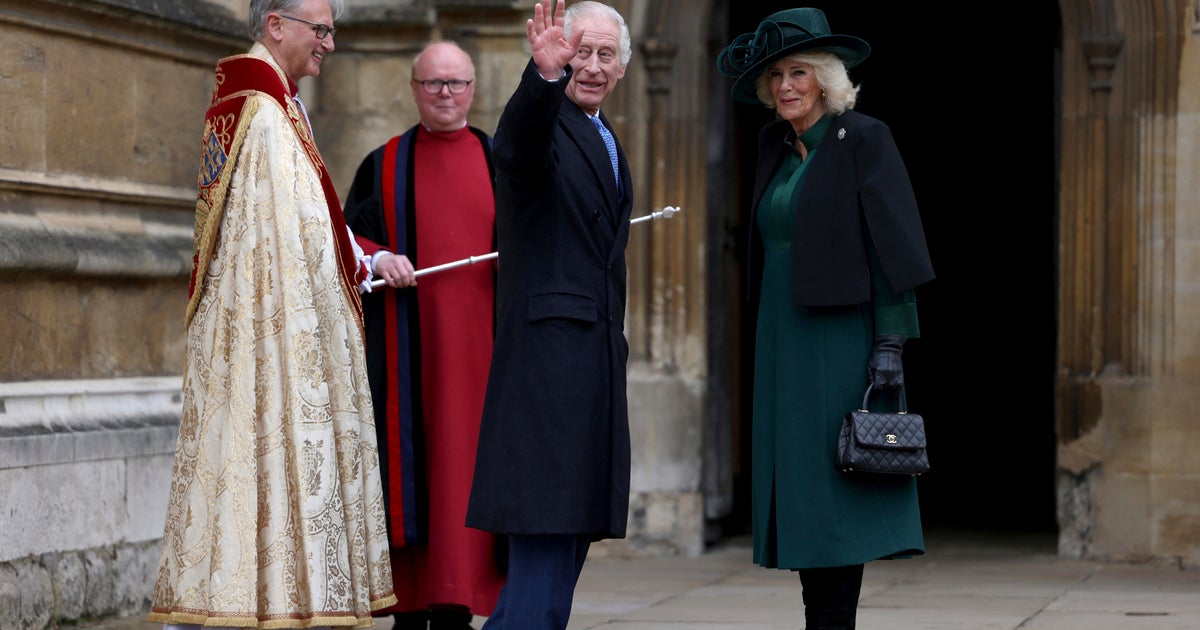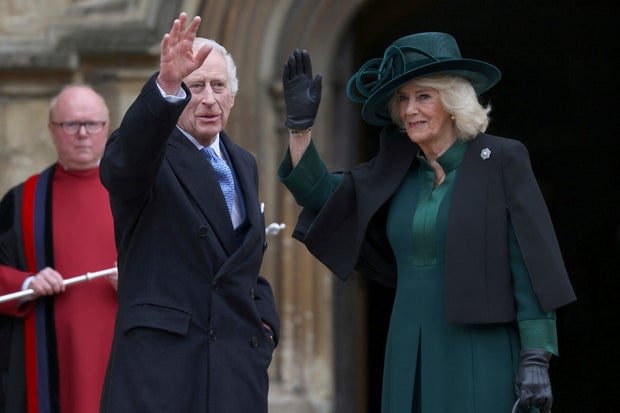King Charles III attended an Easter service on Sunday at Windsor Castle, marking his most noteworthy public appearance since being diagnosed last month with an undisclosed form of cancer.
The visit could be serving as a comforting precursor to the king’s eventual planned return to the public-facing duties from which he has been largely absent in the wake of his diagnosis and treatment.
The monarch offered a cheery wave to spectators as he walked into St. George’s Chapel for a service expected to last about an hour. A member of the public shouted “Happy Easter,” with Charles responding, “And to you.” He rejoined the crowd after the service ended, speaking to people who had gathered there and shaking their hands, the BBC, a CBS News parter network, reported.
Hollie Adams/Pool Photo via AP
Charles attended Sunday’s service along with Queen Camila and other members of the royal family. His siblings, the Duke of Edinburgh, the Duke of York and Princess Anne were all in attendance, along with the Duchess of Edinburgh and their son James and Anne’s husband, Sir Timothy Laurence, according to the BBC.
Sarah Ferguson, Prince Andrew’s ex-wife who was diagnosed with skin cancer earlier this year, was also in attendance.
But the service itself was smaller than usual. Catherine, Princess of Wales, known to the public as Kate Middleton, is also being treated for cancer and said in a viral video message announcing the news that she would be doing so privately. Princess Kate did not attend the Easter service, nor did her husband, William, Prince of Wales, or their three children.
The 75-year-old monarch’s appearance is seen as an effort to reassure the public after Charles stepped back from public duties in early February following an announcement by Buckingham Palace that he was undergoing treatment for an unspecified type of cancer.
The king has continued fulfilling his state duties, such as reviewing government papers and meeting with the prime minister. He was also seen attending a church service with Camilla in February, shortly after the cancer diagnosis was announced. But Charles’ attendance at a traditional royal event like the Easter service is seen as a sign that he is beginning a managed return to public life. British media reported last week that Charles would slowly increase his public appearances after Easter. He did not attend a pre-Easter service, which is another traditional event known as Maundy Thursday, with Camilla attending in his place.
Hollie Adams/Pool Photo via AP
That was originally the same date that Kensington Palace said Kate would return to the public eye after recovering from major abdominal surgery in January. Kate shock’s announcement that she, too, had cancer was made on March 22, after weeks of speculation about her health and whereabouts. The princess ended the video announcement by telling viewers that she would continue to take time and space to heal as she undergoes preventative chemotherapy.
Charles’ enforced absence from public life has been a setback for a man who is eager to put his stamp on the monarchy after waiting almost 74 years — longer than any previous heir — to become king.
When he succeeded his mother, Queen Elizabeth II, Charles faced the daunting task of demonstrating that the 1,000-year-old monarchy remains relevant in a modern nation whose citizens come from all corners of the globe. After less than two years on the throne, the king is still defining himself with the public as he tries to persuade young people and members of minority communities that the royal family can represent them.
Although the duties of a constitutional monarch are largely ceremonial, the job of being a royal can be exhausting.
Besides the occasional procession in full royal regalia, there are meetings with political leaders, dedication ceremonies and events honoring the accomplishments of British citizens. That added up to 161 days of royal engagements during Charles’s first year on the throne.



